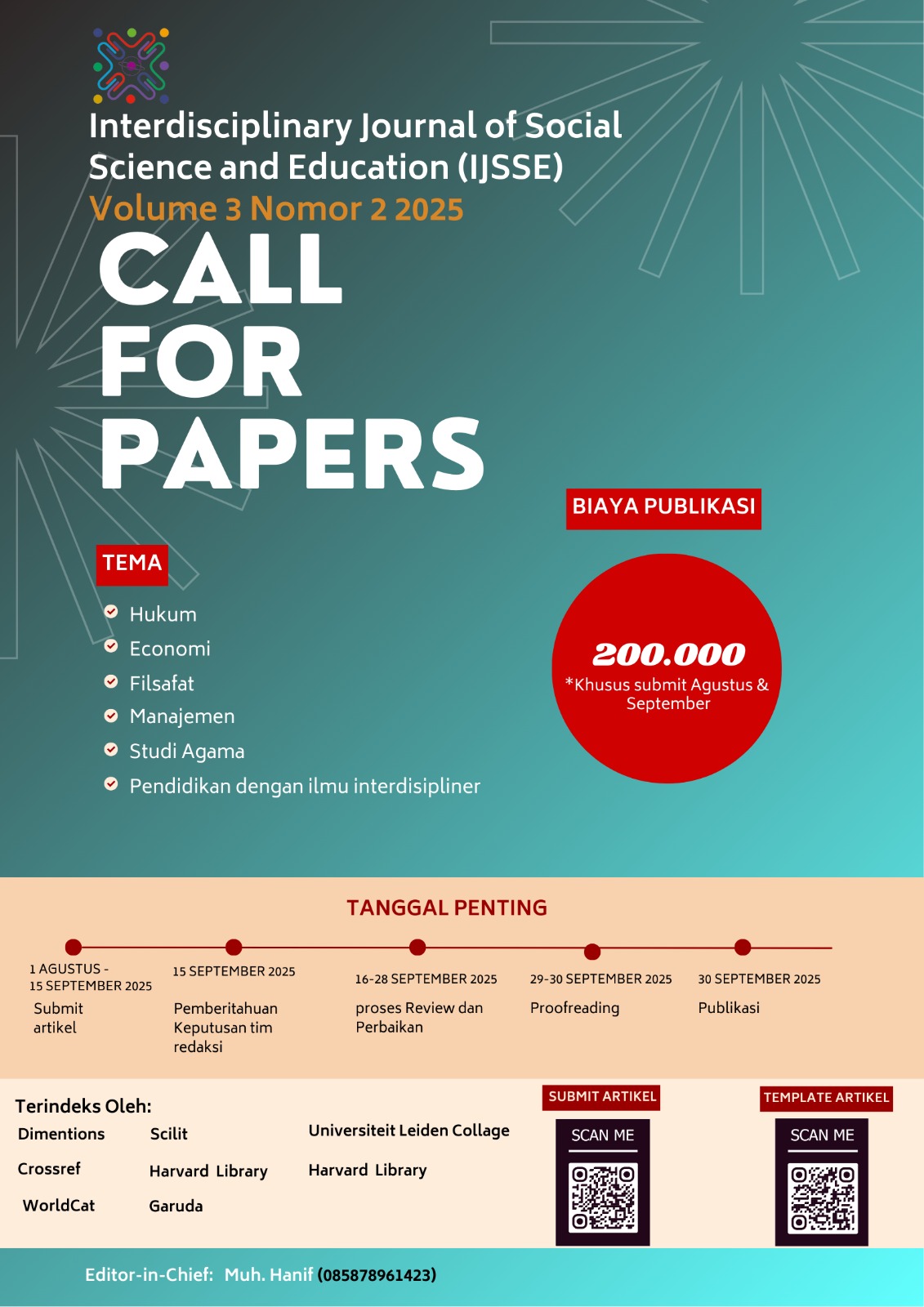The Meaning and Intent of Istitha'ah (Ability to Marry) Perspective of the Shafi'i School
DOI:
https://doi.org/10.53639/ijsse.v1i1.11Keywords:
Istitha'ah, Shafi'i School, Jima’Abstract
Istitha'ah is an ethic for those who want marriage. In the madhhab of Imam Syafi'i, istitha'ah is the ability of the prospective groom to fulfill the obligations in marriage, such as providing maintenance, protecting the wife, and fulfilling the rights of the wife. The strongest emphasis of the Shafi'i school of thought is on the aspect of the ability to have intercourse. In the present era, the meaning of istitha'ah may not be on the aspect of intercourse, but on the element of ability implicitly, the word means being able to have intercourse accompanied by pre and post-marriage costs.
Downloads
References
‘Audah, Husain ibn. (1429H) al-Mausu‘ah al-Fiqhiyyah al-Muyassarah, Beirut: Dar Ibn Hazm.
Abdulloh, Haidir. (2016). Terjemah Bulughul Maram. Surabaya: Maktabah Ahmad Nabhan.
Abdurrahman. (1995). Kompilasi Hukum Islam di Indonesia. Jakarta: CV. Akademika Pressindo.
Al Haitami, Ibn Hajar. (1983) Fatawa al kubra al fiqhiyah. Beirut: Darul Fikr.
Anshari. (2010). Hukum Perkawinan Islam. Jakara: Cakrawala.
Ar-Rifai Usamah ‘Abdul Karim. (2008). At-Tafsir al Wajis Li kitabillahil ‘Aziz. Jakarta: Gema Insani.
Azwandi, A. (2018). Kedewasaan Menikah Perspektif Hukum Islam Dan Hukum Positif Di Indonesia. Qiyas: Jurnal Hukum Islam dan Peradilan, 3(1).
Handayani, Sri. Dua Syarat Seseorang Dikatakan Mampu Menikah, Diakses Dari http://Republika.co.id, Pada Tanggal 15 September 2023.
Hori, M., & Cipta, E. S. (2019). The Purpose of Marriage in Islamic Philosophical Perspective. Journal of Islamicate Studies, 2(1), 18-25.
Idris, Ahmad. (1996). Hukum Perkawinan Indonesia. Surabaya: Al-Miftah.
Khaliq, Abdul Abdurrahman. (2010). Menuju Perkawinan Barokah. Yogyakarta: Al-Manar.
Muhammad, I. (2022). Kriteria Istithoah Menikah Bagi Pemuda Perspektif Madzhab Imam Syafi’i (Studi Analisis Hadits Riwayat Imam Bukhari) (Doctoral Dissertation, Universitas Nahdlatul Ulama Al Ghazali Cilacap).
Nawawi, ‘Uqudu al-Lujain (Th.). Suka Bumi: CV Putra Asslam.
Putri, J. E., & Taufik, T. (2017). Kematangan Emosi Pasangan yang Menikah di Usia Muda. JRTI (Jurnal Riset Tindakan Indonesia), 2(2).
Sabiq, Muhammad Sayyid. (2009). Fikih Sunnah. Jakarta Pusat: Pundi Aksara.
Sufyan, A. F. M. (2017). Analisis Kritis Makna “Al-Syabab” dan “Istitha’ah” Pada Hadits Anjuran Menikah. Al-Ulum Jurnal Pemikiran dan Penelitian ke Islaman, 4(2), 304-317.
Sufyan, A. F. M. (2017). Analisis Kritis Makna “Al-Syabab” dan “Istitha’ah” Pada Hadits Anjuran Menikah. Al-Ulum Jurnal Pemikiran dan Penelitian ke Islaman, 4(2), 304-317.
Wiryono. (1978). Pernikahan Adalah Hidup Bersama Laki-laki dan Perempuan. Jogjakarta: Media Abadi.
Zakiyah, Drajat. (1995). Ilmu Ushul Fiqih. Yogyakarta: Dana Bakti Wakaf.
Downloads
Published
How to Cite
Issue
Section
License
Copyright (c) 2023 Fikri Musyafa

This work is licensed under a Creative Commons Attribution-ShareAlike 4.0 International License.
Authors who publish with this journal agree to the following terms:
- Authors retain copyright and grant the journal right of first publication with the work simultaneously licensed under a Creative Commons Attribution License that allows others to share the work with an acknowledgement of the work's authorship and initial publication in this journal.
- Authors are able to enter into separate, additional contractual arrangements for the non-exclusive distribution of the journal's published version of the work (e.g., post it to an institutional repository or publish it in a book), with an acknowledgement of its initial publication in this journal.
- Authors are permitted and encouraged to post their work online (e.g., in institutional repositories or on their website) prior to and during the submission process, as it can lead to productive exchanges, as well as earlier and greater citation of published work (See The Effect of Open Access).


















